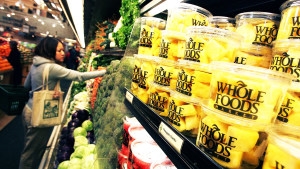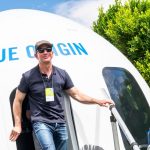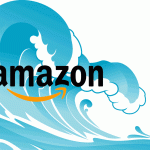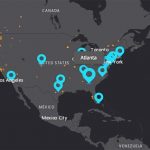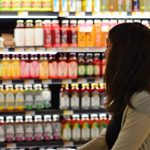Amazon’s Grocery Ambitions Are Far Bigger Than Whole Foods
When Amazon debuted its invitation-only beta test of a fresh grocery delivery service in August 2007 for the small community of Mercer Island in Washington State, no one would have predicted that it would one day lead to a $13.7 billion acquisition of the Whole Foods grocery store chain.
Which is why it’s important to remember that Amazon CEO and founder Jeff Bezos—a decade into his experiment with the logistics of delivering fresh food—is only just getting started. This is Amazon, a company whose ambitions are exponentially larger than Whole Foods’ $16 billion in annual revenue.
A decade from now, not only will the way you shop for groceries in the United States have changed, but Amazon could well have begun transforming the way people around the world get their food. Because for Amazon, perishables represents much more than an opportunity to beat this country’s largest grocer, Walmart. It’s an opportunity to rethink the entire process of food sourcing and distribution.
“You can’t invent if you aren’t willing to think long term,” Bezos told me during our interview this past November (Why Amazon Is The World’s Most Innovative Company Of 2017).
“Trial and error, and finally you find a success,” he added. “And that takes long-term thinking.”
The laboratory for Amazon’s grocery experiment is now global—in most any city where Amazon has a fulfillment center it will be able to deliver groceries, too. “It’s usually no more scientific than here’s where our fulfillment center is, let’s start with the zip codes right around, and just keep extending that,” Amazon SVP of North American Retail Doug Herrington told me in November when I asked about the company’s expansion into groceries.
In the last two years, Amazon has launched grocery initiatives in the United Kingdom, Spain, Italy, France, Germany, and Japan. These moves are already seeking to upend decades and even centuries of entrenched behavior. In Milan, for example, Amazon delivers 30 kinds of fruits and vegetables through its Prime Now app, items that once would have been picked up at a local open-air market. In June of last year, the mayor of Paris, Anne Hidalgo, posted a press release criticizing Amazon’s introduction of Prime Now (which includes delivery of fresh and frozen groceries). Along with questioning the impact it would have on local businesses, she asked Amazon to guarantee that it would not worsen the city’s pollution problems. Then in December, the French chain Monoprix produced a television spot spoofing the ad Amazon created to tout its checkout-free GO stores. Their version proudly proclaims, “You don’t need an app to go shopping.”
Last week, reports began circulating that New Delhi will grant Amazon the right to begin delivering groceries. And just this week news of preliminary acquisition talks between Amazon and BigBasket, India’s largest online grocery, began to leak. One of the requirements set forth by the Indian government before allowing foreign companies to start selling groceries to consumers is that they must provide produce and processed foods that are locally sourced—a challenge that Amazon is more than ready to embrace.
“There’s a subset of customers—I think it’s a pretty big subset—that when you’re talking about things that go in or on your body, or in or on your children’s bodies, they really care about that supply chain,” Bezos told me in our interview.
Amazon’s approach to making that supply chain more transparent can be seen in their “Elements” premium product line, which includes vitamin supplements and baby wipes that come with a unique code that customers can use to track each ingredient, as well as its place of and date of origin (the disodium phosphate in Elements baby wipes comes from Augusta, Georgia in case you were wondering).
From that perspective, the acquisition of Whole Foods—the market that made organics mainstream, where every chicken has a backstory (even if it’s just a Supermarket Pastoral fiction)—seems like a great philosophical fit. For more on this, read our earlier coverage about Whole Foods CEO John Mackey’s management style: “The Anarchist’s Cookbook.”
But just how deep was Amazon willing to go, I wondered? After all, Bezos spent some of his formative teenage years doing farm work on his grandparents’ Texas ranch.
“We won’t make our own,” Bezos told me. “We’ll use experts to manufacture those products, but we’ll inspect and audit how it’s done, and where the raw ingredients are sourced from.”
As Herrington revealed, there’s more than philosophy at play here. Many of the manufacturers that Amazon sources its products from, including NicePak, the maker of those baby wipes, already keep track of their supply chain. “But it was new for them to have a partner who wanted to make that visible to the customer,” he said.
So Amazon tasked its developers with building software to ingest the data from NicePak’s internal systems and make it available in Amazon’s logistics centers as well as its consumer-facing website.
Now imagine Amazon doing that all over the world. Just as it has built an operating system for e-commerce, Amazon is now poised to create one for our food supply chain. It would allow Bezos to offer the highest-quality, safest, freshest, and cheapest groceries anywhere on the planet.
The supply chain and distribution challenges that Amazon is already mastering are part of what landed Whole Foods in a position to be acquired in the first place. Jana Partners, the activist investment firm that was agitating Whole Foods to change, was calling for an overhaul of the grocer’s supply chain and distribution strategy as recently as this past April.
Even if Amazon’s acquisition of Whole Foods turns out to be a failed experiment, the world’s largest online retailer will have learned, gathered a ton of useful data, and be that much closer to serving its customers’ every desire.
In our interview late last year, Amazon founder and CEO Jeff Bezos discussed how his supply chain ambitions could be applied to perishables as well.
When Amazon debuted its invitation-only beta test of a fresh grocery delivery service in August 2007 for the small community of Mercer Island in Washington State, no one would have predicted that it would one day lead to a $ 13.7 billion acquisition of the Whole Foods grocery store chain.
Fast Company , Read Full Story
(49)

